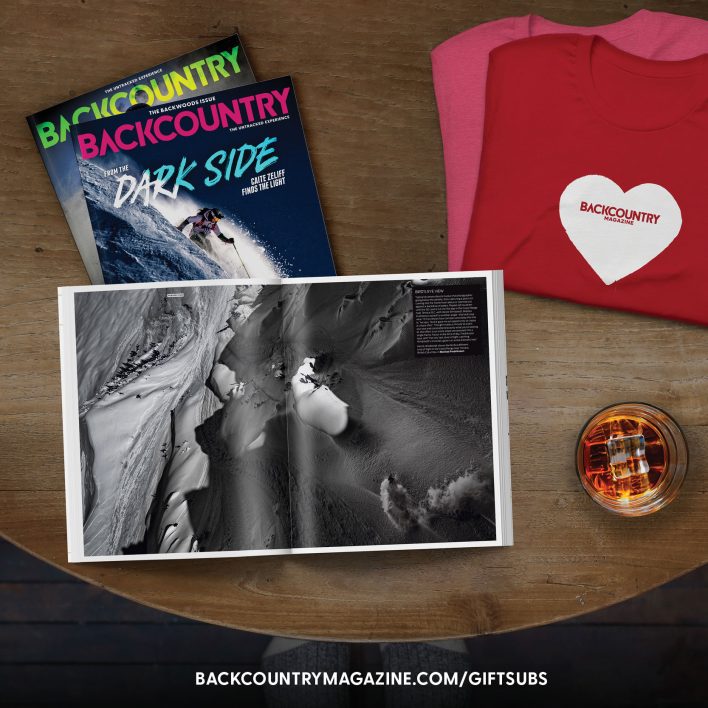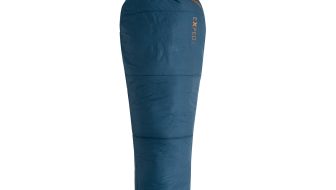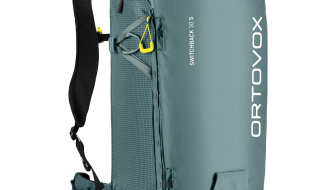It wasn’t yet summer, but the day’s high temperature would reach 90 degrees. And as we loaded trucks with bikes, boards and beers for a late-season tour on Deseret Peak in Utah’s Stansbury Mountains at 12:30 a.m., it was already balmy. Lording high above the vast West Desert, Deseret is the tallest mountain in the range and stands with more than 5,000 feet of prominence. But what really makes skiers salivate are Deseret’s North Couloirs—twin chutes on the summit ridge that hold snow well into summer.
We call our backcountry ski group the “Niños Jugando,” or “children playing.” But to play in the mountains this late in the season, our crew of six had to arrive at South Willow Canyon by 2:30 a.m. and park near the closed winter gate to organize gear. By 3, we were on our mountain bikes, traveling the dry but still closed road. The dirt road kept a sustained pitch, and with skis, AT boots and enough food and beer for the day weighing me down, pedaling on a damn road never felt so hard. And yet the nocturnal slog had its own reward as riding by headlamp in a pitch-black, narrow canyon to go skiing felt strangely surreal.
![[Photo] Jared Hargrave](http://backcountrymagazine.com/wordpress/wp-content/uploads/2013/05/IMG_3611.jpg)
Sometimes you need to get creative on late-season ski-touring ascents. The “Niños Jugando” geared up for a pedaling slog on South Willow Road. Stansbury Mountains, Utah. [Photo] Jared Hargrave
We transitioned, then skinned from drainage to alpine meadow as the purple sunrise over the Great Salt Lake far below glowed like a reverse aurora borealis. Then, the dim light gave way to alpenglow on summit cliffs, throwing skiers into silhouette.
![[Photo] Jared Hargrave](http://backcountrymagazine.com/wordpress/wp-content/uploads/2013/05/IMG_3652.jpg)
Sean Zimmerman-Wall skins below Deseret Peak as dawn breaks on the summit cliffs. [Photo] Jared Hargrave
Quickened by the aesthetic beauty of the twin couloirs, I switchbacked up the apron with new energy until forced into Stair-Master mode. It was a tedious, yet simple chore, booting between the massive cliffs peppered with faded moss, yet it burned my legs that were already shaky from the bike ride and skintrack.
Around noon, we crested the summit ridge, and after a short traverse and another bootpack below a corniced shoulder, I gratefully stood on the summit. Lunch and beers were objects of celebration as I shared an “epic sit” with my friends on shelves of rock overlooking Utah’s desert moonscape. We traded theories about which deadly chemical weapons the government stored in the miles-long rows of underground bunkers that spread across the monochrome valley below. Meanwhile, I also discovered that U.S. Geological Survey Markers make excellent beer coasters.
The intense summer sun coupled with sheer exhaustion made me lazy. Giddy from a combination of zero sleep, a strenuous climb, and craft beer consumed at high altitude, it took a feat of internal strength to pry myself off the warm rocks and complete what I came here for.
Wasting time on the summit yielded enough sun-on-snow baking to create perfect corn. I made buttery turns down the south face and then traversed back to the saddle above East Twin. One by one, we dropped into the corridor. When I cut my first turn, I whooped in jubilation as my skis found al-dente corn on the sunny side of the chute that gave way to pure cream on the wide apron. Slap-happy after skiing down such an epic, sought-after line, we located a dry, safe area to watch wet slides boom off the summit cliffs like ghostly waterfalls. I passed around a flask of whiskey, stared at the twin couloirs, and retraced my curvatures in the corn.

![[Photo] Jared Hargrave](http://backcountrymagazine.com/wordpress/wp-content/uploads/2013/05/IMG_3751.jpg)
![[Photo] Jared Hargrave](http://backcountrymagazine.com/wordpress/wp-content/uploads/2013/05/IMG_3840.jpg)








Related posts:
Austral Aspirations: SheJumps Executive Director Claire Smallwood talks about summers spent in the S…
Summer Stashes: A Diehard’s Guide to Skiing All Year
Summer Stashes: The Great One
Summer Stashes: Beartooth Pass, Montana